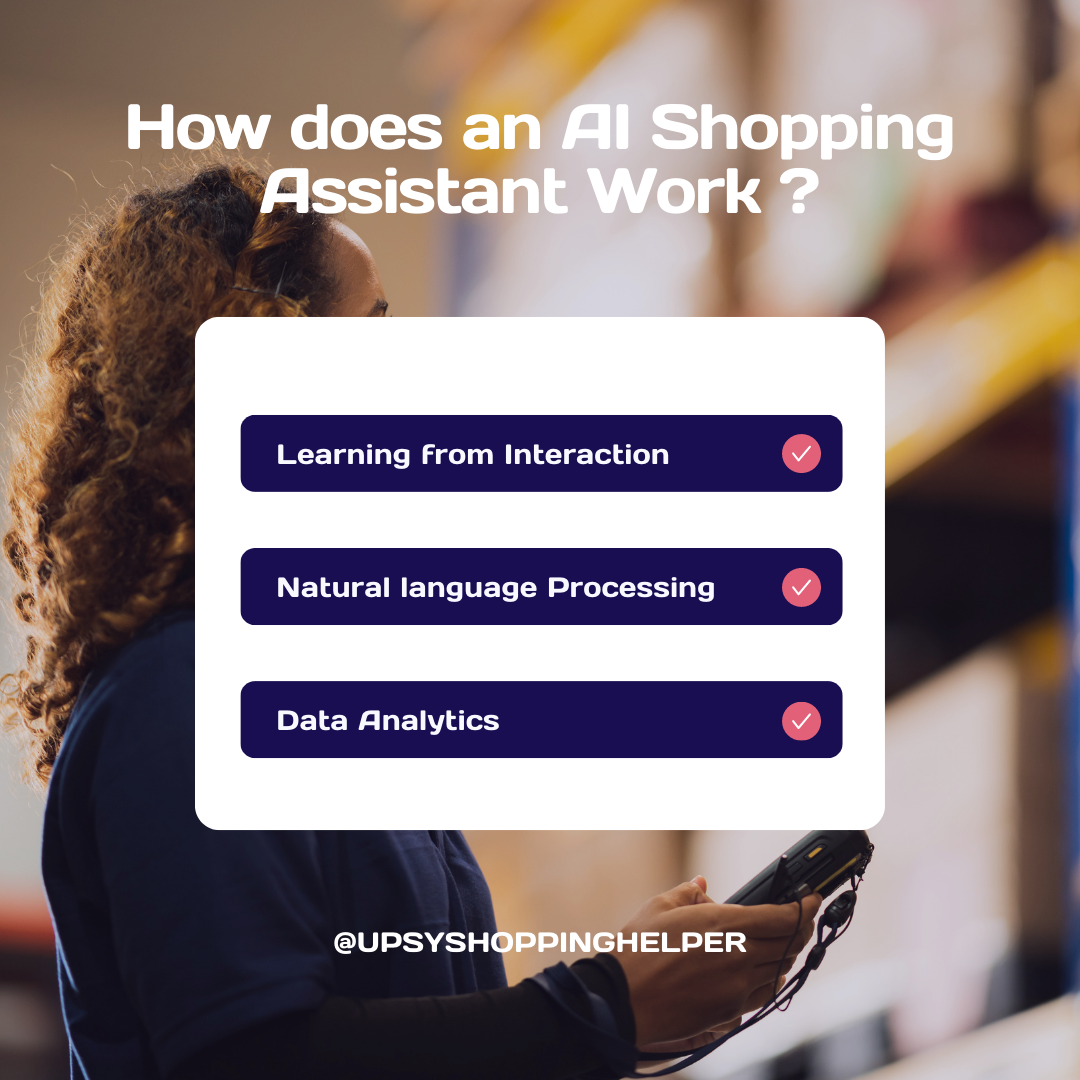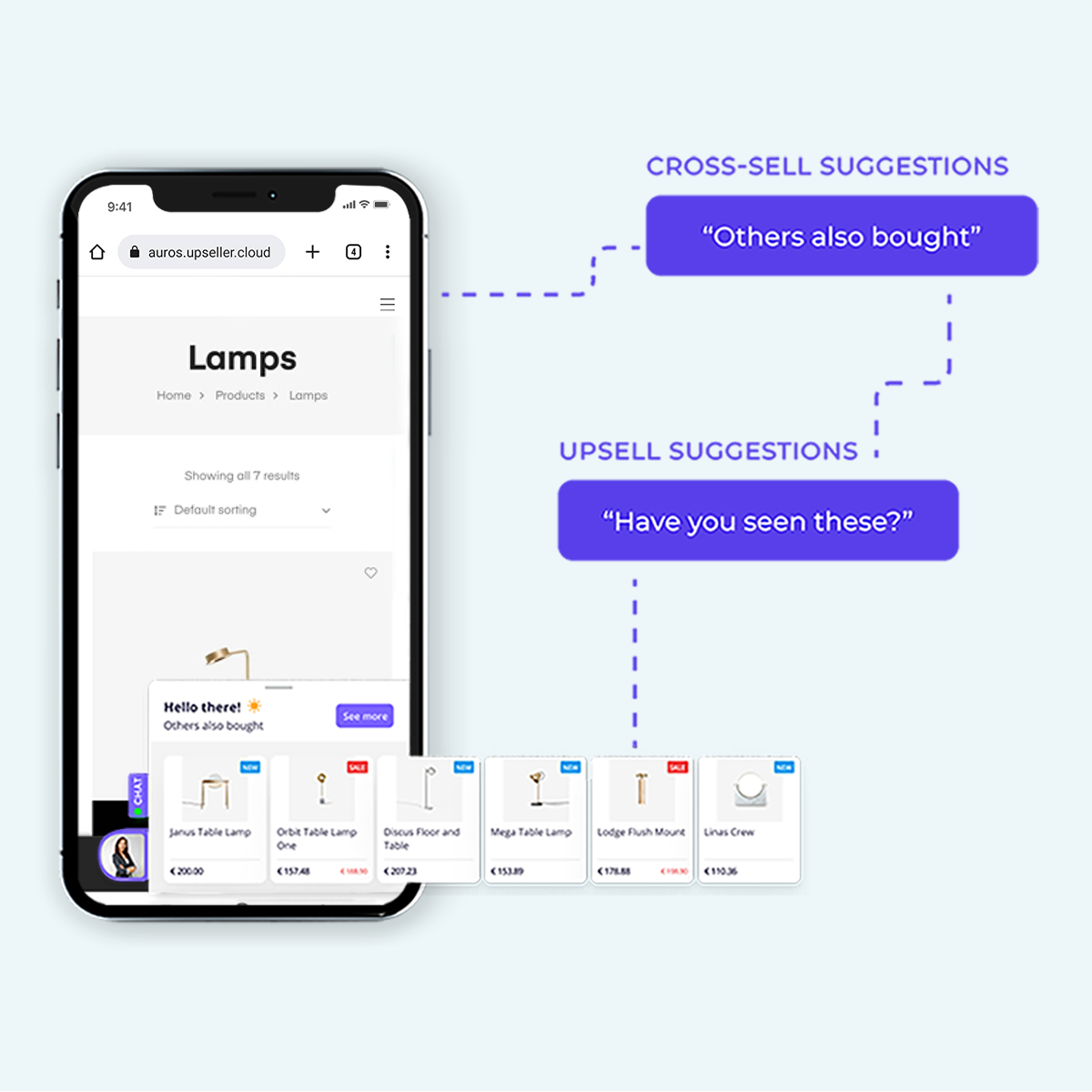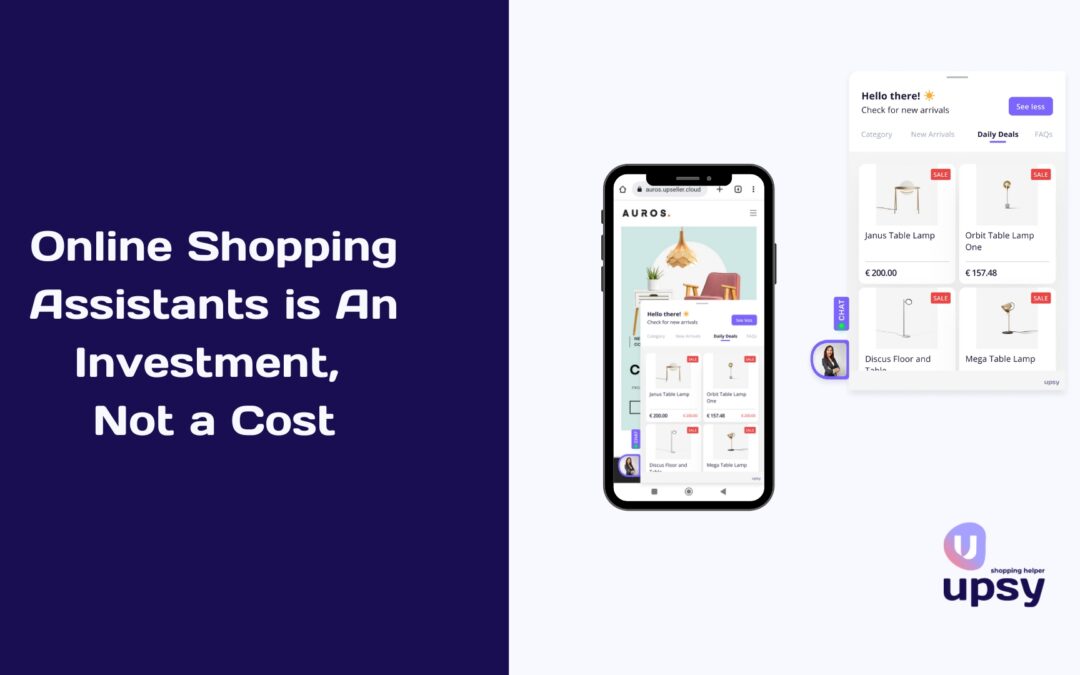Picture this: you have a physical store, bustling with customers to offer a good shopping experience. Your staff is busy helping clients, offering advice, answering queries, and nudging them gently toward the checkout. Now, how do we replicate this personalized service in e-commerce? That’s where a digital shopping assistant for online stores comes into play.
What is a Shopping Assistant for Enhancing Online Shopping Experience?
A shopping assistant is like your online buddy for shopping. It helps you find what you love, answers your questions, and makes buying stuff a breeze. It’s here to help you with:
- Answering Queries
- Quickly responds to customer questions, enriching the online shopping experience.
- Product Suggestions
- Recommends products tailored to shopper preferences, adding a personal touch to the online shopping experience.
- Smooth Process
- Facilitates an easier and more seamless online shopping experience, from browsing to checkout.
By offering these features, a shopping assistant significantly elevates the quality of the online shopping experience.
3 Key Types of Shopping Assistants for Improving Online Shopping Experience
Shopping assistants make online buying easier. Here are the top 3 types to make your shopping a breeze:
- Chatbots
- AI Shopping Assistant
- Live chat
Chatbots
Chatbots are your go-to for quick answers and easy tasks. They handle common questions, guide you through checkout, and make your shopping experience more efficient.
- Quick Responses
- Handle FAQs and provide product info instantly, streamlining the online shopping experience.
- Task Handling
- Guide customers through checkout, simplifying the online shopping experience.
However, their abilities are confined to pre-set tasks. They can’t handle complex issues, leading us to AI shopping assistants.
AI Shopping Assistants
AI Shopping Assistants use smart tech like machine learning to get to know shopper’ preferences. It makes personalized product suggestions base on their the online store’s data and customer behaviours.
- Complex Query Handling
- Understand and answer intricate questions, elevating the online shopping experience.
- Dynamic Learning
- Continually adapt and improve based on user interactions, making each online shopping experience better than the last.
Live Chat
Live chat connects you with real people for real-time help. They answer your tricky questions and offer tailored advice. It’s like having a store clerk in your online shopping world, making everything more personal and efficient.
- Human Interaction
- Provides real human support, making the online shopping experience feel more personalized.
- Complex Problem-Solving
- Ideal for intricate queries requiring human judgment, enhancing the online shopping experience.
However, they do have limitations like fixed working hours and handling capacity, but they add a valuable human touch to the online shopping experience.
Based on the table below, you can easily compare features and pick the shopping assistant that best meets your needs.
| Chatbots | AI Shopping Assistants | Live Chat | |
| Pros | |||
| Availability | 24/7 service, no wait times | 24/7 service, no wait times | Limited to agent availability |
| Scalability | Can handle multiple queries simultaneously | Can handle multiple queries and can make personalized product recommendations simultaneously | Limited to the number of live agents available |
| Personalization | Limited, mostly based on preset scripts | Highly personalized, can learn customer preferences and provide tailored recommendations | Highly personalized, human touch |
| Cost | Lower costs in long term due to automation | Lower costs in the long term due to automation | Higher costs due to the need for human agents |
| Speed | Instant responses | Instant responses and recommendations | Dependent on the agent’s typing speed and availability |
| Cons | |||
| Understanding Complex Queries | May struggle with complex queries or out-of-context requests | Better at handling complex queries but might still face issues with very specific or out-of-context requests | Can understand and address complex queries due to human involvement |
| Flexibility | Limited flexibility in responses | Greater flexibility due to learning algorithms, but still limited compared to humans | The highest flexibility can adapt to unexpected questions or situations |
| Mistakes | Can provide incorrect information if not programmed properly | Can provide incorrect recommendations if the algorithm isn’t accurate | Can also make mistakes, but can correct them in real-time and provide explanation |
If you run an SME webshop, an AI shopping assistant is your best bet.
It’s more affordable than live chat. It also does double duty as both a sales tool and customer service aid. Unlike simple chatbots, these AI assistants learn from each customer chat. They get better at giving personalized advice and solving problems.
So, they’re not just cost-effective; they also adapt and improve. This makes them a strong choice for SMEs aiming to grow.
AI Shopping Assistants: Improving Online Shopping
An AI Shopping Assistant takes advantage of Artificial Intelligence (AI) and machine learning to offer a deeply personalized online shopping experience.
AI will change customer service by offering personalized assistance and real-time recommendations to shoppers. The retail industry is projected to catch significant growth in AI, reaching $24.1 billion globally by 2028 according to Forbes
How Can AI Shopping Assistants Improve the Online Shopping Experience?
AI shopping assistants utilize a mix of advanced technologies like machine learning, natural language processing (NLP), and data analytics to improve your online shopping experience in several ways:
- Personalization
- Learns from your behavior and preferences to offer tailor-made recommendations, making your online shopping experience unique.
- Efficiency
- Quick and accurate product suggestions help you find what you need faster, streamlining the online shopping experience.
- Dynamic Adaptation
- Continuously updates its algorithms based on your interactions, continually refining your online shopping experience.
AI shopping assistants not only answer shopper questions but also anticipate their needs, thereby ccreating a smooth shopping experience for shoppers.
Customers are increasingly expecting some form of automation. According to research by PwC, “nearly 80% of American consumers say that speed, convenience, knowledgeable help and friendly service are the most important elements of a positive customer experience.” That percentage is likely to grow since consumers value speed and convenience in their shopping and more are expecting personalized experiences driven by data.
How does an AI Shopping Assistant Work?

- Learning from Interactions: Every time a customer interacts with the AI assistant – whether they’re browsing products, making a purchase, or even returning an item – the assistant records and learns from these interactions. This information helps the AI understand the customer’s preferences, allowing it to provide more personalized recommendations in the future.
- Natural Language Processing (NLP): NLP enables the AI assistant to understand and respond to customer queries in a human-like manner. Whether a customer types a question or uses voice commands, the AI can comprehend the request and provide a relevant response or action.
- Data Analytics: AI shopping assistants can analyze vast amounts of customer data in real time. This analytical capability enables the assistant to identify trends, predict customer behavior, and make accurate product recommendations. It also allows the AI to alert you about potential inventory issues or opportunities for sales and promotions.
Exploring the Variety: Common Types of AI Shopping Assistants For Online Shopping experience
AI shopping assistants come in several types, each designed to address the specific needs of customers and enhance their shopping experience. Let’s delve into a few popular kinds of AI shopping assistants and their applications.
1. Virtual Try-Out Assistants: The New Dressing Room
Certain innovative platforms are now equipped with a tool called ‘Choose My Model’. This AI-powered tool uses the prowess of computer vision technology, letting customers experience how an outfit would look on them without physically wearing it.
Fashion brand Rebecca Minkof found that 65% of visitors were more likely to place an order after interacting with AR.
Imagine the convenience. No more guesswork about sizes or fit. You can virtually see how the garment drapes your form. This not only instills confidence in your purchase decision but also reduces the chances of product returns due to unfitting clothes.
2. AI Sales-Focused Shopping Assistants
Some AI shopping assistants are primarily focused on sales, aimed at promoting products in a personalized manner. Upsy is an excellent example of this. It understands customer behavior, their likes, and dislikes, and recommends products accordingly.
Instead of bombarding customers with random product suggestions, Upsy ensures that the recommendations are aligned with the customer’s interests. This makes the shopping experience not only more pleasant but also more efficient. Customers are likely to spend less time browsing and more time purchasing, increasing your store’s conversion rate.

AI Shopping Assistants Meet Chatbots
With advancements in AI, online retail is being transformed through features like ‘Ask Klarna’, integrated with chatbots such as OpenAI’s ChatGPT. This innovative blend is revolutionizing how consumers interact with e-commerce platforms by offering smart assistance capable of comprehending complex consumer queries.
For instance, a user may ask, “What should I wear to a wedding in Santorini in July?” By deploying advanced algorithms, these AI-enabled chatbots interpret the request, factor in user preferences, and deliver tailored recommendations. This convergence of AI shopping assistants and chatbots like ChatGPT is redefining online shopping experiences, positioning platforms as comprehensive shopping destinations.

4 Benefits of Shopping Assistants for Buying Experience Online
Online Shopping Assistants as a salesperson for online store
Artificial Intelligence (AI) has brought a paradigm shift in the way we perceive online shopping assistants. The latest crop of these assistants, powered by AI, are capable of understanding complex customer intentions, making recommendations based on past purchases, and even predicting future shopping trends. AI elevates the shopping assistant from a mere query resolver to a personalized shopping guide.
Effortless Navigation with an AI Shopping Assistant
Many visitors leave e-commerce websites without making a purchase due to overwhelming options or unclear product descriptions. An online shopping assistant simplifies this journey. It intelligently categorizes products, streamlining the browsing process, and making shopping seamless and effortless for your customers.
Upselling and Cross-Selling: Maximizing Profits with Online Shopping Assistants
Online shopping assistants excel at the subtle art of upselling and cross-selling. By understanding customer preferences, they can suggest complementary products or premium options. This not only enhances the shopping experience but also boosts your store’s profitability.
AI Online Shopping Assistants Keep Up with the Change of Customer Preferences
Customer preferences change with time, and your store needs to adapt accordingly. Online shopping assistants continuously learn from customer interactions, updating their recommendations based on evolving customer preferences. This keeps your store dynamic and in sync with your customers’ needs.
24/7 Support: Shopping Assistants That Never Sleep
Customer service shouldn’t be bound by time zones or business hours. Online shopping assistants provide round-the-clock assistance, answering customer queries and addressing their concerns at any hour. This ensures a consistently high-quality shopping experience for your customers, regardless of when they choose to shop.
But it’s not just webshop owners who win. If you run a webshop, a shopping assistant offers big benefits for your shoppers
Shopping Assistant for Online Store: A Win for Customers
Reduce The Shopping Time For Customers
A shopping assistant for your webshop makes shopping quicker. How? It gives you advice on what to buy and even finds similar items or things that go well with what you’re looking at. This means shoppers don’t have to spend hours searching.
For example, after shopper selects their desired product and put them into the basket, the system automatically put a relevant complementary product to suggest.
Feels Like In-Store Service
A shopping assistant creates an environment almost like shoppers are in a real store. They’re there to help, answer questions, and guide you. This makes you feel looked after, just like your shopper would in a physical store.
Bring a human touch to the E-commerce.
Shop Assistants: why webshops should invest
Online Shopping Assistants: An Investment, Not a Cost
Think of your online shopping assistant as an investment that reaps multiple returns rather than a mere operational cost. It enhances the customer experience, drives up sales, and generates valuable customer insights. Over time, it can significantly improve your store’s overall performance and profitability, offering a return on investment that far exceeds its initial cost.
Scalability: Shopping Assistants Enable Your Business to Grow
An online shopping assistant is a scalable solution that can handle thousands of visitors simultaneously. It learns and grows as your business grows, ensuring your customers continue to receive the same level of attention and service. It’s a smart investment that allows your e-commerce platform to scale smoothly.
Are Online Shopping Assistants the Future of E-commerce?
People shop online because it is convenient. If you make it difficult, they will find somewhere else to spend their money. Online shopping assistants are key to helping shoppers find what they want quickly and easily. If physical stores have salespeople to help shoppers experience smooth service, who do you have on your online store to guide your customers through their buying journey?
If you don’t have one, check out Upsy Shopping Helper—an AI shopping assistant for SME online stores.
